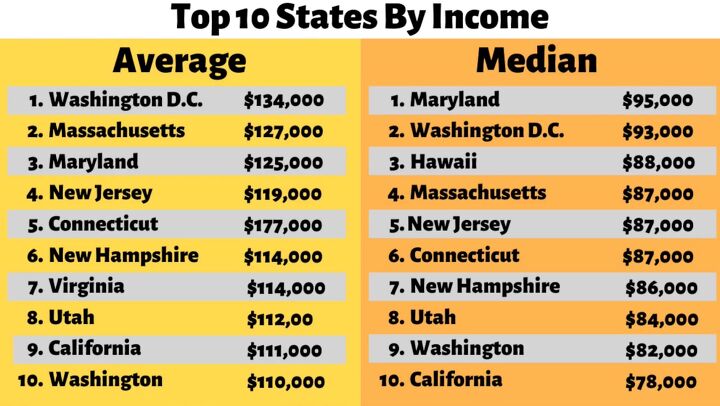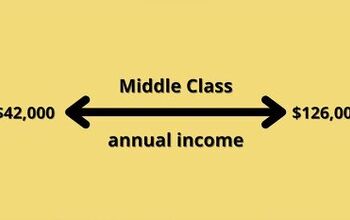What is the Average Income by State & Why is It Important?

I enjoy these sharing averages, as in average income by age or average debt by generation. Today I'll cover average income by state, and we will cover average income as well as median income. We are going to throw in the District of Columbia as well.
This information is presented for households and individuals, and all of the information was gathered by the US Census Bureau.
Average income overall and highest average states
As of 2020, the average income across the US for households is roughly $98,000. The median income for the US household is about $68,000. Those averages and medians can look quite different depending on your state. Let's start with the top ten states, including Washington, DC.
With the highest household average income, Washington, DC, has an average income of $134,000 per year. To be in the top ten, a state has to have an average household income of well over $100,000.
Median income by state
Let's throw out the top ten household median incomes by state. As a comparison, we'll see that Maryland tops the list, but Washington, DC, is a close second. Washington, DC, has the highest income average of anywhere else in the country, with over 45% of their residents earning over $100,000 annually.
How to interpret the data
Just because a state has the highest average income does not guarantee it will have the highest median income because we must remember that super high-income earners can often skew averages.
It's important to note that many of these states with high average and high median incomes are in very high cost-of-living states.
Also, these states top the charts regarding educational attainment, meaning a larger percentage of their population completes high school and attains a bachelor's degree. Income tends to increase with education.
States with the lowest average income
Now, let's look at the flip side of this. Here are the ten states with the lowest household average income, and we'll also throw up the list of the ten states with the lowest household median income.
In comparison, Mississippi ranks the lowest in average and median income. Many of these states also rank the highest in poverty, with Mississippi again topping the charts with roughly 20% of their citizens living in poverty.
The cost of living in these states is markedly lower. If we compare Washington DC, it's 84% higher than the cost of living in Jackson, Mississippi. Education has a lot to do with this.
Mississippi, West Virginia, Louisiana, Arkansas, and Alabama all have the lowest number of degree holders of anywhere else in the country.
A perfect score coming in for any state is 100. We see the state that ranks the highest in education is Massachusetts, with a score of 80. Compare that with Mississippi, which has a score of just 19, and you can see why there are greater income disparities.
Education and income
A lack of education can lead to a lack of good job opportunities. How about the rest of the country?
As you can see, most states have an average income in the $70,000 to $80,000 a year range. When it comes to median income by state, it tends to hover around $60,000 for the typical state.
Each state does offer different job opportunities. Opportunities that are available in New York City are unlikely to be available in Wyoming. A lawyer in New York City will likely make far more than one in Jackson Hole, Wyoming.
It's important to remember that a high and a low salary are all relative.
You have to look at your expenses. What are your expenditures compared to your salary? Because at the end of the day, it's not what you make, it's what you keep.
Average and median incomes for individuals
All preceding figures were given for US average and median household incomes. But because not everyone is coupled up, let's look at average and median individual incomes in the US.
Again, all of these stats are as of 2020, as reported by the US. Census Bureau, the overall average for individuals in America is $62,000, and the median income for an individual is $43,000.
Looking at the average income by state, we see much of the same pattern we saw with household incomes, which isn't all that surprising. All those same reasons hold true for individuals as they did for households.
As far as averages go, we can see the vast majority of states tend to cluster in the $50,000 range and flip over to the median for individuals in the US. Again, it follows the same as medians for the household.
Arguably, the median is a better metric for your typical American, and we see that the median does seem to cluster into the $40,000 range.
Household vs. individual income
It's important to note the distinction between household income and individual income. Individual income is pretty straightforward. It's just one single person's income. Household income, however, is a little bit more complex.
According to the government, they count anyone over the age of 15 living in the household and what their income is towards household income. This can be interesting when you get multiple generations living together, or it doesn't even matter if these people are related.
From the government's standpoint, you could have a house full of roommates, and all their income is counted towards the household income. This can help to explain some of the disparities in why household incomes tend to increase faster than individual incomes.
It's important to note that the US Census Bureau does factor in those homes that report a zero-dollar annual income, so they're not simply looking at positive figures. That said, the average will always be higher than the median because we will always have those rare birds with incredibly high incomes.
If you're interested in increasing your salary, ensure you are always learning and keep increasing your skill set. The more skills you have, the more marketable you are and the more desirable you are as an employee.
Also, remember that different states may offer greater job potential, so you might consider relocating. Remember that those higher-wage areas likely have a higher cost of living. It doesn't do you any good to move double your salary but buy a house that's so expensive that you can barely pay your mortgage. That isn't necessarily better off.
Average income by state
Average income by state stats can be helpful when you're choosing where to live. What do you think of your state's median and average income? Comment below with your thoughts and where you are from.
























Comments
Join the conversation